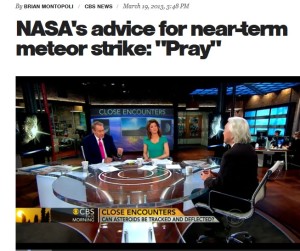Well, everybody on the Eastcoast saw it. But nobody got a good video of it, I guess.

I love even just sky watching on a clear evening. So it would have been cool to see for myself the asteroid/meteor-whatever-it-was that streamed across the sky in all its bright green and crazy colored glory tonight. Unfortunately I missed it. On the flip-side, fortunately it missed us all.
However, thanks to budget cuts for space studies, that might not be the case for long.
Physics professor Michio Kaku explains, “We are sitting ducks in 2029 if asteroid Apophis hits the earth. It’ll miss… but it’s 1000 feet across. It’s a nation buster. It’ll take out England. It’ll take out Germany. That’s how big it is.”
The goal currently? Deflect it, obviously. But we also are trying to actually land on it to see what we’re working with. “Why not just blow it up Bruce Willis style?” you might ask. Well, then we’ve got tons of other little rocks coming at us (aka rapid fire damage from tons of space rocks. It’s a frying pan/fire situation).

Besides, these floating babies could be a gold mine!
Um, Ashley… Why does that matter when our lives are at stake? Well, I’m glad you asked! You see, people are selfish and greedy and space researchers might just be able to capitalize on that. If a few rich bastards can fund trips to these Russia-sized rock-rockets in hopes of having some priceless crap flown back to them, perhaps a “beautiful friendship” could form between them (private money) and space research (public money). Eventually, perhaps some of that money could even go toward unselfish projects like – I dunno – saving Earth from smaller asteroids too.
You see, when it comes to asteroids, the phrase “less is more” couldn’t be more accurate. It’s actually the smaller one that are a bigger issue.
The potential solution is stupid simple, too. All we really need is a machine called a “space based infrared telescope”. Mouthful, I know; but basically, it’s the best bet for spotting these little asteroids easier and earlier. Unlike current technology, it won’t let the sun hide them from our view, so we can see them early enough to do something about it.
As it stands, however, if a smaller asteroid (like the the one that hit Russia) were to approach anytime soon, we’d barely have three weeks warning. NASA administrator’s advice regarding that pickle?
“Pray.”
“The threat is real,” says Kaku, “In Russia if that asteroid had held intact for a few more seconds, it would have hit the Earth with the force of 20 Hiroshima bombs. Casualties would have been in the hundreds of thousands.”
Currently, we can’t afford this simple telescope because the government won’t fund it – even though the figure it would cost (compared to what our country wastes on other tomfoolery) is minimal. It could also be easily be met too, however, if a group of Forbes’ favorite cover models got together and doled out a few donations. That would be the real slow-motion, heroes-walking-and-holding-their-helmets moment for me.
In reality, however, I (and the rest of Earth) will have to settle for the less noble monetary means when millionaires mine meteors from the safety of their mansions.
xoxo
<3~A
3 Comments
Velt
Nice article. I love me some science! Check out the Yarkovsky effect. All we should need to deflect an asteroid is a little spray paint (and a 500 million dollar rocket to launch it with).
Ashley
lol, Greg. I found the silver paint theory a little odd too; but if it’s that simple, awesome!
Cosmic cue ball and unsung heroes. « Miss Ashley Pants
[…] a flaming cosmic rock lit up the skies of Murmansk a week or two ago, I got to thinking about an article I did about a year back – about the one the East coast saw and the kajillion that hit the Russian […]